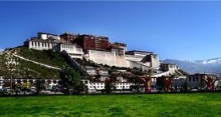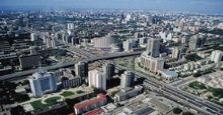题目内容
据报道,我国许多城市的中小学生有了不同形式的新型“寒假作业”,以下是相关情况:
1. 武汉地区:给父母洗脚,让学生学会孝敬父母;
2. 长沙地区: 卖报纸,让学生体验生活, 学会独立;
3. 广东河源地区; 学讲客家(Hakka)故事,让学生更好地传承文化。
【写作内容】
请你根据上面提供的信息写一篇英语短文,包括如下要点:
1. 各地学生假期作业的形式及其目的;
2. 你对上述假期作业的看法。
【写作要求】
只能使用5个句子表达全部内容。
【评分标准】
句子结构准确,信息内容完整,篇章结构连贯。
参考词汇:孝敬 show love and respect
It is reported that some new types of holiday homework are assigned to primary or middle school students in some cities of China. For example, students in Wuhan are required to wash feet for their parents so that they can learn to show love and respect for them. In Changsha, students are asked to sell newspapers to experience life and learn to be independent. Another case in point is that students in Heyuan of Guangdong Province have to learn to tell some Hakka tales, which is considered a good way to preserve local traditional cultures. In my view, these kinds of homework can not only reduce study load but do a lot of good to the development of students' all-round abilities.
【解析】
这是一篇材料作文,文章结构已经大致给出,要求我们分别描述各地学生假期作业形式及目的,然后表达自己的观点及看法。注意用词精准。前半部分大致内容已经给出,要适当增加细节内容,保持文章结构完整,内容连贯。文章第一句It is reported that some new types of holiday homework are assigned to primary or middle school students in some cities of China.开门见山,表明中国一些城市的中小学已经引入了各种新型的假期作业,立即引入了文章主题,并且使用强调句型以及被动语态,增强了句子可读性;第二句For example, students in Wuhan are required to wash feet for their parents so that they can learn to show love and respect for them接着表明了武汉地区的假期作业形式以及目的,for example开始举例,将文章展开,并使用了so that句型表明目的;第三句In Changsha, students are asked to sell newspapers to experience life and learn to be independent介绍了长沙的情况,使用了被动语态,使用了动词不定式的并列表明了目的;第四句Another case in point is that students in Heyuan of Guangdong Province have to learn to tell some Hakka tales, which is considered a good way to preserve local traditional cultures.介绍了广东河源地区的情况,使用了宾语从句以及非限制性定语从句,最后部分使用了动词不定式作way的定语;第五句In my view, these kinds of homework can not only reduce study load but do a lot of good to the development of students' all-round abilities最后一句in my view承上启下,直接表明作者自己的观点,作者认为这些形式的假期作业不仅能减轻学生的负担还能对学生的全面发展有好处,使用了not only…but also…句型。 在词语的运用上,也十分出彩,使用了很多精彩短语:types of表示很多类型的……,be assigned to表示被分配到,be required to表示被要求做某事,learn to do表示学着做某事,show love and respect for them显示对父母的爱与敬意,be asked to表示被要求做,be considered a good way to表示被认为是一个做某事的好的方式,in one’s view表示在某人看来,do a lot of good to对……非常有好处,all-round abilities表示各方面能力。这些短语的使用提升了文章的档次,读起来也津津有味。
考点:考查材料作文写作。

阅读下列材料,从所给的六个选项(A、B、C、D、E 和 F)中,选出符合各小 题要
求的最佳选项,选项中有一项是多余选项。请在答题卡上按题号56-60将相应选项字母涂黑。
A |
| City: Lhasa Temperature in July:15-17℃ Attractions: blue sky, fresh air and wonderful dances |
B |
| City: Harbin Temperature in July: 24-30℃ Attractions: some old buildings in Russian style |
C |
| City: Chongqing Temperature in July: 28-30℃ Attractions: tall mountains, hot food and friendly people. |
D |
| City: Hong Kong Temperature in July: 29-30℃ Attractions: nice and cheap clothes, all kinds of tasty food and chances to find good jobs. |
E |
| City: Guilin Temperature in July: 29-30℃ Attractions: fantastic hills, clean rivers and many other natural sights. |
F |
| City: Sanya Temperature in July: 27-32℃ Attractions: exciting water sports, lovely beaches and great tropical fruit. |
请阅读以下五个人的信息,然后为他们选择最适合的一处地方:
1.Joe comes from Moscow(莫斯科). He has studied in Beijing for two years. So he misses his hometown very much. He hopes to go to a city where he can find the feeling of returning home.
2.Mary is an American girl. She likes going shopping. This year she’ll graduate from a famous Chinese college. So she is planning to travel to a city where she may find a job.
3.Henry is from Canada. He is interested in surfing and diving. But the city in which he is living is far from the sea. So he is expecting to get to a place where he can do these activities and taste bananas and pineapples(菠萝).
4.Rosa comes from Britain. She cannot stand hot weather. And she thinks some Chinese cities have too much pollution. So she wants to go somewhere clean and peaceful.
5.Timmy comes from Japan. He has great interest in taking photos. He is looking forward to staying close to nature. He even wants to take a boat while taking photos. However, he doesn’t like hot food.





